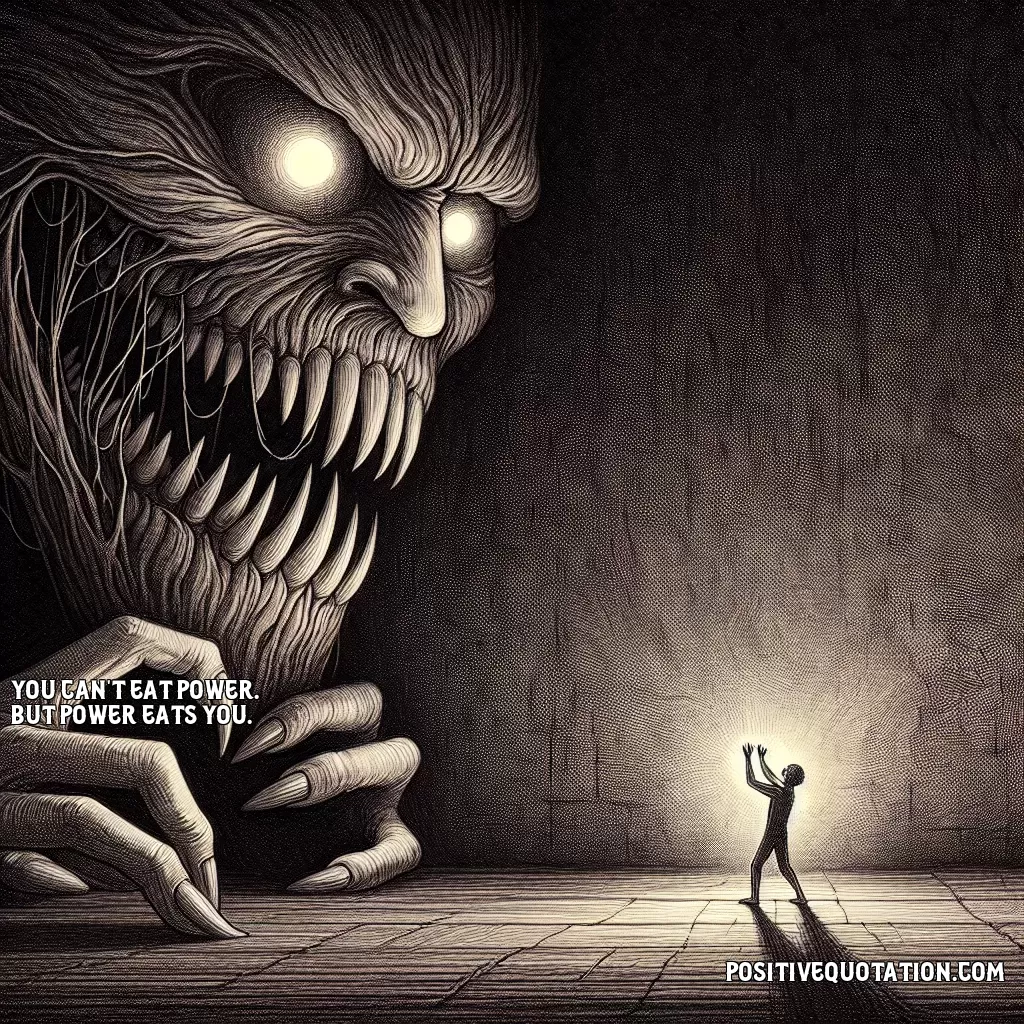
You can't eat power. But power eats you.
Author: Ursula K. Le Guin
👁️ 6 views
This quote encapsulates the paradoxical nature of power as both alluring and potentially detrimental. At its core, the quote highlights the insatiable appetite of power; it's intangible, yet it has the capacity to consume those who wield it. The phrase "You can't eat power" signifies the idea that power in itself is non-material and cannot provide for basic human necessities like food or shelter. Unlike tangible resources, power cannot satisfy physical needs. It symbolizes the emptiness and the abstract quality of power. It is not a sustenance you can consume or a commodity you can utilize directly for basic survival. This part of the quote suggests that power, while tempting and often pursued, lacks the immediate, tangible benefits that are necessary for life. The second part, "But power eats you," speaks to power's destructive potential. It suggests that excessive pursuit or possession of power can erode one’s character, values, and relationships. The metaphor of being "eaten" conveys a sense of loss of self-control or humanity in the relentless quest for power. As individuals become increasingly consumed by their desire or possession of power, they risk being overwhelmed by it, potentially leading to corruption, greed, and a disconnection from what truly matters in life. Together, the quote warns of the seductive yet dangerous nature of power, cautioning against letting it dominate one's life to the point where it devours one's integrity and sense of purpose. It serves as a reminder to balance ambition and ethical considerations, encouraging reflection on whether the pursuit of power is truly worth its cost to the soul and psyche.
Quote By: Ursula K. Le Guin
Ursula K. Le Guin was a prominent American author known for her profound contributions to the realms of science fiction and fantasy. Born on October 21, 1929, in Berkeley, California, Le Guin was the daughter of an anthropologist and a writer, an upbringing that deeply influenced her literary career. She developed an early interest in reading and storytelling, which would blossom into a lifelong passion. Le Guin went on to attend Radcliffe College and received her Master’s degree from Columbia University, where she studied French and Italian literature.
Her literary career began in the 1950s, and it was during the 1960s that Ursula K. Le Guin gained significant recognition. She is perhaps best known for her Earthsea series, starting with "A Wizard of Earthsea" in 1968, which introduced readers to an intricate world of magic and self-discovery. Le Guin's works often explored complex themes such as gender, sociology, and anthropology, drawing on her background in these fields. Her thought-provoking narratives challenged conventional norms and invited readers to contemplate the dynamics of power, identity, and culture.
In addition to Earthsea, Ursula K. Le Guin gained acclaim for her novel "The Left Hand of Darkness," published in 1969. This groundbreaking work examined themes of gender and sexuality through its portrayal of a planet where residents could change their sex. Le Guin's unique blend of imaginative storytelling and insightful social commentary solidified her status as one of the most influential writers in speculative fiction.
Throughout her career, Ursula K. Le Guin received numerous awards, including the Hugo and Nebula Awards, and she was a finalist for the National Book Award. Her impact on literature extended beyond the pages of her novels; she was also an essayist, poet, and translator who engaged deeply with the world around her. Ursula K. Le Guin passed away on January 22, 2018, but her legacy endures, with her works continuing to inspire generations of writers and readers alike. Her exploration of human experience through speculative fiction has forever transformed the genres she so passionately pioneered.